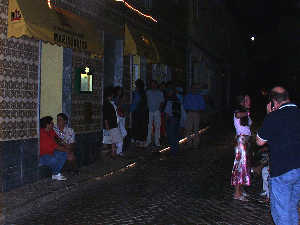
August 2000
Shellfish Samba
Milling around outside Marisqueira Rui, Silves on a summer's evening
Silves, The Algarve, Portugal August 21st, 2000 Patience is required when you visit the Marisqueira Rui in Silves, especially in summer. For, though located inland about 10 km from the coast, this is one of the most popular shellfish restaurants in the Algarve. We had made a booking for 7.30. The restaurant will not guarantee holding a table any later than this. Indeed when we arrived, people already were sitting in a line of chairs set up outside on the stone-paved streets of the old town, once the Moorish capital of the region. On the door there was a clipboard with a pencil and people would come, put their names on the list, and then either sit down or just mill around in the warm glow of a summer's evening, content to wait even as long as a couple of hours. Young couples dressed up for a special evening out; huge Portuguese groups of families and friends; the odd foreign tourists; families with young children: all were waiting in patient expectation.
We arrived ten minutes late, delayed because of the Fatacil, an annual rural festival in Lagoa that causes havoc each year to the roads due to the sheer numbers attending. I asked a waiter whether our table might still be available. He looked at his watch, then at us sadly and rather disapprovingly, and shook his head: our table had already been given away to someone else. Not to worry, he smiled. Take a seat outside, it would not be too long, and would we like a cerveja while we were waiting?
The crowds continued to build up while we chilled out with a cold glass of beer and enjoyed the street scene. No point in worrying about it: you come to Rui knowing full well that eating out is not just about sustenance and satiating hunger but equally about enjoying the especially keen pleasure of a meal enjoyed in anticipation and imagination. The equation seems to be something like: the longer you wait, the more you see people being seated in front of you, the more smells of fish and shellfish the you inhale, the greater the pleasure you will ultimately get when you finally sit down to enjoy your meal. Patience, as we say, is not just a virtue but a prerequisite.
Rui, make no mistake about it, is an absolutely no-frills eatery: long trestle tables, stainless steel chairs, paper table cloths, strip lighting. Not big on decor, but huge on atmosphere. Every night it’s like improvised street theatre, pure entertainment. Waiters literally run from table to table, carrying stainless steel platters and terracotta casseroles and piles of plates, and more piles of plates; and they return to the kitchen carrying piles of plates and more piles of plates. Others dip their arms into the tanks that line the entranceway to fish out immense and wriggling spider crabs, lobsters, crabs, and crayfish. There is a near endless procession of waiters bringing small, straight glasses of cerveja by the half-dozen and plates of hot buttered rolls, dishes of mayonnaise, platters of food. Bottles of wine are brought full and quickly taken away empty; bicas of espresso and digestifs such as the dangerously potent medrohno are brought to the table along with the bill to celebrate the finish of meals.
When you finally make it to your table (for the record, we waited outside about an hour), a plate of freshly boiled prawns is immediately brought as a reward. Instantly you know that the wait has been worthwhile, for these prawns are not to be missed: still warm from the boiler, the shells hard but easy to remove (as they always are on the freshest), they are firm and sea fresh and utterly delicious. As you eat, you wipe your hands with small paper serviettes; you wipe the prawn juice that dribbles down your chin with small paper serviettes; the floor of Rui is littered with small paper serviettes. Afterwards, you wash your hands in a steel bowl filled with warm water and a lemon, dry them with small paper serviettes. These delicious prawns, enjoyed with a couple of small straight glasses of ice cold cerveja and those hot buttered rolls, are truly one of the great simple pleasures of life, as much for the exceptional sweet flavour and dense yet tender meat as for the ritual of eating them and cleaning your hands afterwards. They are the ultimate appetiser, served simply to prepare you for the feast of shellfish that lies ahead.
As we looked over the menu we were entertained by a cacophony of happy, busy noises that is always a feature of dining at Rui. At a table next to us, a couple of big chaps, working men, sat side-by-side in matching uniform, busying themselves over a platter of búzios, a sort of spiky whelk much loved around here. In front of each of them there was a little tile-sized marble pad and the method quite simply was to tap the shell firmly and repeatedly until the rather rubbery creature emerges. Should it not be forthcoming, you simply tap harder, dammit. Once out, dip the critter in mayonnaise, consume, take the obligatory swallow of ice cold Sagres beer, and repeat. The tap-tap-tap on the marble pad provides a sort of light rhythmic beat to other more persuasive syncopations.
A family alongside us, for example, were beating out a shellfish samba as they feasted on a freshly boiled santola, or spider crab, another great favourite at Rui. Though the spider crab, lacking meaty claws, demands considerable devotion to prise, suck and otherwise coax stubborn meat from spindly legs and body, this family clearly had no inhibitions or problems in extracting every last morsel from the hot boiled crustaceans in front of them. Each member had been given not delicate metal utensils (as in France), but a hefty wooden mallet, and they were all swinging and banging away with rthymic gusto, so much so that every time we heard a loud crack, we involuntarily ducked, taking evasive action to avoid being hit by flying bits of shell, and other crabby debris. Give them their due: not that all that much escaped their hungry grasps. Indeed when the waiter finally came to take away the platter, there was little left but a small pile of pulverised shell and not much more; mother and father, meanwhile, sat back with full and satisfied expressions, while the two children continued to bash hell out of anything and everything in sight with those wooden mallets -- a Fanta can, an empty packet of sardine paste, a plastic ice cream tub. Thank goodness they didn’t have a baby brother or sister...
We meanwhile followed our boiled prawns with another Rui favourite, a plate of gambas da costa frito, big, meaty local prawns, fried in the shell in boiling olive oil and garlic, sprinkled with sea salt, and served piping hot. The smell as the platter is brought to the table is irresistible: pick one up, oh oh, too damn hot to try and peel, so just pop it straight into your mouth. So fresh and tender are these beauties that you simply twist off the heads, hold them by the tail, and devour them shell and all. A plate of perceves, gooseneck barnacles gathered apparently at Sagres, meanwhile, provided an intriguing contrast to the hot and crunchy prawns. Brought to the table straight out of the boiler, I was unsure how to tackle these rather unprepossessing sea creatures. My Portuguese neighbour, sensing my timidity, offered to show me: he took hold of one of the leggy looking things, twisted off the craggy ‘claw’ at one end, and a stream of salty juice squirted out at me. Hah! he cackled in delight, and held up the sliver of quivering, squidgy, sea-hot meat for me to suck off greedily. Muito bom, he said with satisfaction and pride, as if he had gathered them himself. Muito obrigado, I thanked him in agreement: for the taste was indeed exquisite, rather iodiney yet sea fresh, and fantastic washed down with a deep slug of an exceptionally dry vinho verde, perhaps Muralhas or the everpresent Quinta da Avelada.
We debated briefly at this point whether to continue this shellfish symphony with a platter of ameijôas, the local clams that we love so much, steamed simply in wine, garlic and coriander, sweet and meaty and salty. Or perhaps a small santola.
But no, it was time to get down to serious business. For us a visit to Rui means only one thing: arroz do mariscos. This shellfish and rice medley comes to the table in an earthenware casserole that has been placed in an immensely hot oven, so that the whole soupy mixture is literally bubbling as the lid is lifted. The smells that emerge are irresistible, and as one never waits sufficiently for the mixture to cool down, you inevitably burn your mouth in haste to try it. This is quite unlike other Iberian rice dishes, and certainly bears no relation whatsoever to the rather dry rice and shellfish paellas as served across the border in Spain. Arroz do mariscos at Rui is quite simply an outrageous celebration of the fruits of the sea. As you dip your spoon into the pot, every bite is a voyage of discovery: here a big chunk of meaty crab, there a fat, sweet prawn; some clams, of course, and oh, and there’s a chewy ring of lulas (squid), a barnacle to pick up and suck, a spider crab leg or two, and many other numerous unidentifiable but utterly delicious titbits, all bound into an integral whole by a soupy mixture of rice simmered in a deeply concentrated shellfish broth with tomato, piri piri chilies, garlic and coriander. This is certainly one of those world class dishes that is worth a journey in itself.
It’s always hot in Rui, don't you think? The air conditioning is rarely man enough for the job, and eating this sort of food is an energetic pasttime that is definitely not for the fainthearted or the lily-livered. It works up a prodigious thirst, too, and inevitably more beers are ordered, another bottle of vinho verde... or two...or three. Traditional Portuguese puddings to finish, of course, outrageously sweet concoctions made with egg white, egg yolk, sugar, almonds. Molotoff, puffy and light as a feather, is a particular favourite. A bica to round of the meal, sim senhor, medrohno, não. Muito obrigado.
Eventually we swagger out, replete in every way, the splatters on our clothing — some barnacle juice, a bit of crab, a little piri piri tinted rice — worn like a badge of honour, testimony to a meal properly eaten and enjoyed. Outside on the street, meanwhile, the crowds are still sitting on the plastic chairs, or milling around, patiently waiting. It’s only 10.30, after all, and the night is young. And besides, as everyone who comes here knows, patience is indeed a virtue. Patience not only to wait for your table, but to celebrate foods that are enjoyed not in hasty amplitude, but rather prised out of stubborn shells in the most minute but delicious mouthfuls. In this way, the children, playing now on the streets, or at the tables with their mallets, learn from the earliest ages that eating out is above all a social, a convivial, a communal hot pot.
The very antithesis, in fact, of the fast food ethos that threatens to consume and overwhelm us.
Marisqueira Rui
R. Comendador Vilarinho, 27
Silves
near Portimão
tel: 082 44 26 82 fax: 082 44 56 82
Closed Tue
![]()
|Home| |QP New Media| |Kim's Gallery|
![]()
Copyright © Marc and Kim Millon 2000
![]()

